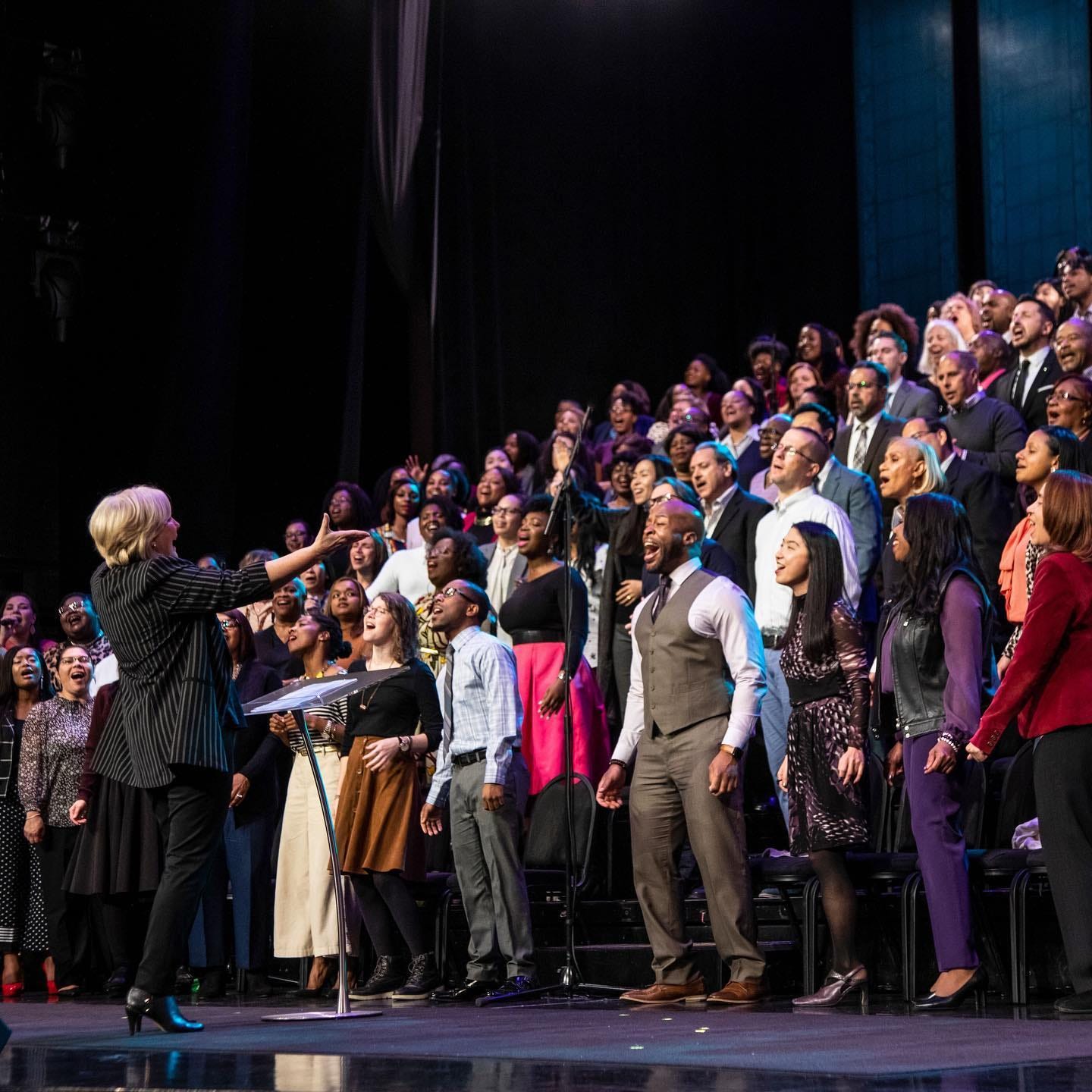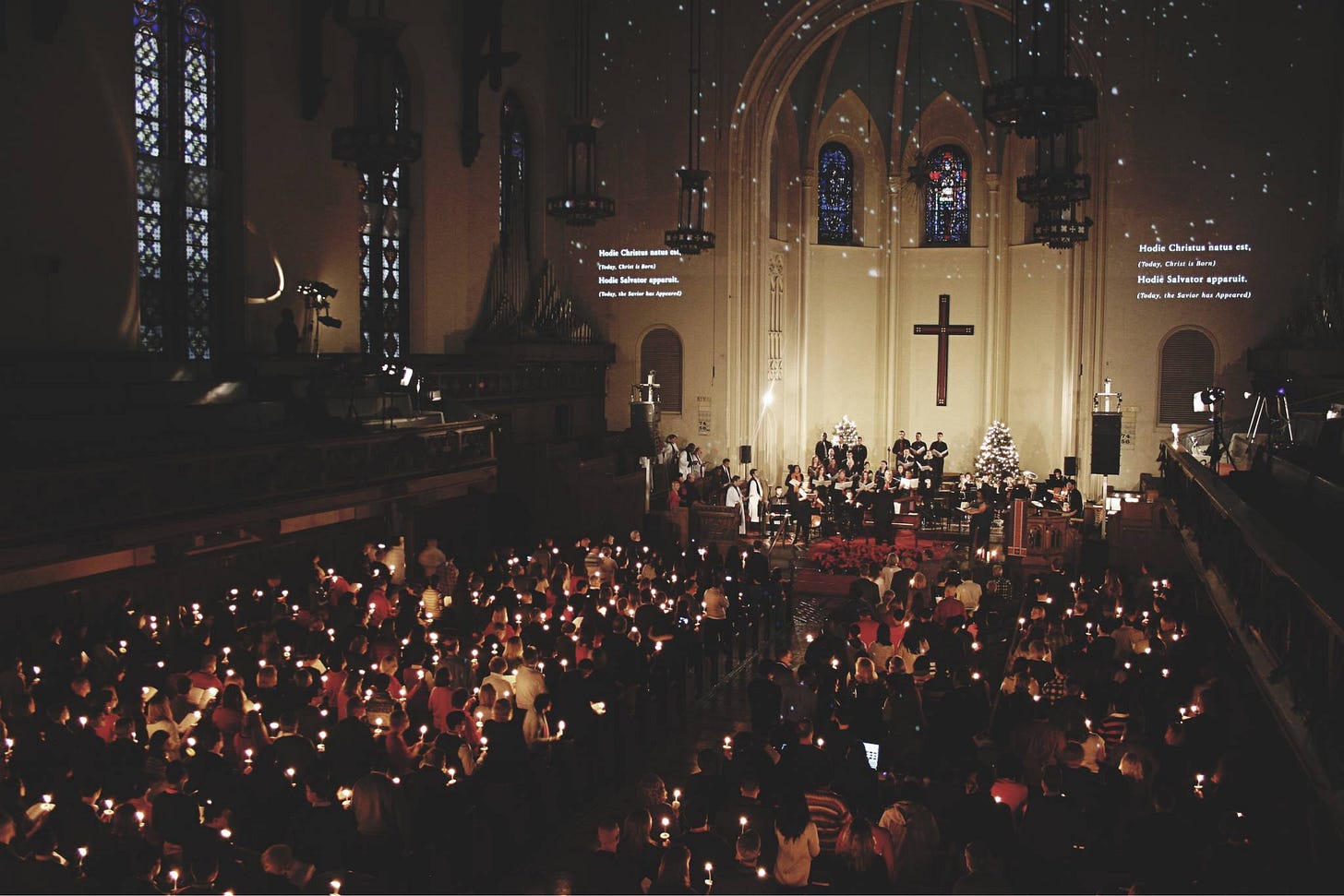Why I still go to church on Sundays
On spiritual amnesia, belonging, and changing institutions from within.
Due to the nature of my work, I sometimes get asked why I still have hope for the church. Why would an institution that’s so deeply mired in scandal, offense, and abuse be an institution worth fighting for or affiliating with?
Is the body of Christ any different from — or better than — any other human institution?
It’s a very important question for me, for us, to wrestle with. It’s one of the most important questions of my life.
I started my career at a magazine that regularly reported on Christian leaders and institutions behaving unchristianly. The cognitive dissonance created by reporting these stories can be immense. The spiritual dissonance can lead to despair. To take one recent, awful example: if a celebrated international apologist can build a career defending the credibility of Christian faith as good news to a watching world, while at the same time abusing untold numbers of women, is the good news he preaches really that good? Wouldn’t the transforming power of that good news prevent predation?
I sometimes speak with people who find that they can no longer walk inside a church building without this dissonance precluding worshiping God and belonging to a church community. If a church was the site of your abuse, the dissonance lives in your body. For some, the deluge of stories of corrupt Christian leaders and institutions prevents them from trusting this leader or community. How do I know they aren’t hiding something too?
For many, the only seemingly livable option is to stop attending church, at least for a time.
I don’t know why I have been spared church-related trauma. Save one painful experience several years ago (at a church whose leaders are now facing allegations that they mishandled the abuse of minors — a post for another time), I have been in churches led by people of integrity, gentleness, and care. When I think about the preservation of my faith over the decades, I in part think of these leaders. They were, they are, good shepherds; they carry the aroma of the Good Shepherd with them. There is concordance between the Jesus they preach and the way they live, and that has made all the difference.
A caveat for readers in pain
For any readers who find they can’t attend a church right now, I want to assure you that what follows isn’t about strong-arming you to change your mind. I don’t and can’t know the specifics of your situation. Whatever they are, I’m going to assume that you have your reasons. Of course, if a church was the site of abuse or mistreatment, I believe the Lord is merciful to meet you as his beloved child in a variety of ways, that no one can take that from you. (I also believe the people who made have made church a painful place for you will be held accountable — which is also part of why I believe the doctrine of the Final Judgment is good news for vulnerable people for whom earthly justice is out of reach; alas, also a post for another time!).
There are all sorts of smug assumptions about Christians who don’t attend church — they want to sin, they’re lazy, they’re just joining the ex-vangelical deconstruction “trend,” etc. I have no interest in joining that cacophonous choir.
Instead, what follows is about articulating the riches I have found attending church on Sunday mornings — and indeed, why I still have hope for the church, despite all the things. And because my brain is so hopelessly analytical, I’m going to bullet-point the heck out of this thing.
4 reasons I go to church on Sundays
#1 Because I’m bad at remembering how to be a Christian.
Living in concordance with the cosmic reality that Jesus is Lord is difficult. It’s always been difficult, and will be difficult in specific ways depending on your location in human history.
My location in human history makes it difficult to live as if Jesus is Lord, because my location tells me that I am actually lord. In a world of endless choice and shockingly effective Instagram ads, I am encouraged to spend my time and energy and money on getting what I want, when I want — then telling myself that it’s all self-care.
We live in a consumerist, capitalistic, and individualistic age. It’s the water we swim in, and the waters in New York City rush especially fast. It’s easy to get caught up in the search for the one experience, meal, Broadway show, or perfectly chilled gin martini that will finally satiate. Of course, it’s a mirage, but it’s an effective mirage for getting people to overpay.

I know and intellectually assent to the truth that our hearts are made for God, and that we’ll be restless and pretty miserable until we rest in him. But much of the time, I act as if my heart will be restless until it rests in that Hamptons getaway.
The philosopher James KA Smith has done lots of work to correct our anthropology. He posits that we humans aren’t primarily thinkers or “bobble-heads.” We don’t think our way into the kingdom of God, as if discipleship is primarily about believing all the right things while spending our lives being good little individualistic consumers. As Smith writes, “the way we inhabit the world is not primarily as thinkers, or even believers, but as more affective, embodied creatures who make our way in the world more by feeling our way around it.”
That means we love our way into the kingdom of God. Discipleship is about becoming people who desire the kingdom. And the way I become a person who desires the kingdom of God is by allowing the Christian liturgy to reshape my heart’s desires week in and week out. The liturgy at the church I attend includes corporate singing, prayers for the world and our neighbors, a time of confession, the reading of Scripture, preaching, and the Eucharist. It’s a beautiful time. It reorients my loves. Smith writes:
Christian worship should tell a story that makes us want to set sail for the immense sea that is the Triune God, birthing in us a longing for a “better country-a heavenly one” that is kingdom come (Hebrews 11:16).
I can’t actually live as if Jesus is Lord on my own willpower, because the alternate cultural liturgies are incredibly powerful. I need to be reshaped every week.
#2 Because going to brunch with friends afterwards is good for my health.
Let me explain.
First, the margaritas are $7, and the tortilla chips are free. To quote Jim Gaffigan: We don’t want to lose money.
But more important, the social bonds of Christian community are not only fun; they could save your life. In a recent interview, filmmaker Pete Davis shared the startling statistic — culled from social scientist Robert Putnam (Bowling Alone) — that your chances of dying in the next 12 months are cut in half by joining just one group. The practical and psychological benefits of community are so great, not having one poses a public health threat on par with alcohol abuse and air pollution. It’s the public health crisis of social isolation.
Discussing their film, Join or Die [trailer above], Pete and Rebecca Davis note that “religious spaces provide half of all social capital in the U.S.” Social capital is good for us as individuals; it’s also crucial to democracy.
But compared with previous generations, fewer of us are “joiners.” We distrust institutions, but also, we just don’t see the need for them. Life in community takes work. Someone has to plan the icebreaker and clean up afterwards. And in “thick” communities (described here), there’s usually some annoyance bumping up against other people, because let’s face it, sometimes people are the most.
Of course, people find community in all sorts of ways and places. There are bowling leagues, book clubs, and anarchist knitting groups. There is a group in NYC that gets together and cuddles. This is all to the good; joining a group is better than none at all. (Well, okay, I can think of a few groups no one should join.)
But for me, as someone who lives alone and works from home, the communal dimensions of the Christian life aren’t incidental or nice add-ons. They are a safety net and a tangible sign of grace. That may be too therapeutic for some, but for people who lack family close by — or any family at all — church community could be the difference between life and death.
#3 Because church includes people who aren’t like me.
More so than previous generations, most of us live in cities and communities filled with people who are just like ourselves. The big sort reflects, and perpetuates, polarization.
And the big sort has come for the body of Christ. We choose the church to attend based on preferences around worship music, preaching style, children’s programming, and the like. We’ll drive 45 minutes (or take a 40-minute subway ride) to attend the church that fits our whole vibe. This means that our fellow churchgoers will be like us in a lot of ways, including education, marital status, race, language, political bent, and income bracket. We approach church affinity as we do everything else: as consumers.
Some of this seems inevitable, and not all of it seems bad. Putnam says there are two types of social capital: bonding social capital, and bridging social capital. Bonding centers on likeness and affinity — “I’ve found my people!” Bridging centers on diversity and curiosity — “We’re different! Tell me about that!” And we actually need both types of connections, to be healthy people and societies.

The wild, even scandalous idea for the body of Christ is that it could be both — a place of both bonding and bridging. It could be a place where people from “all nations and tribes, all races and languages” (Rev. 7:9; The Message) now see each other as family because of Jesus. And that this would happen without anyone having to give up their distinct background, or assimilate to the dominant culture, or be tossed into a Jesus-flavored melting pot.
The vision for the church was radical from its inception, and it’s radical today. I’ve only been part of one congregation that took this vision seriously — that worked hard to counter the sorting and homogeneity we’re accustomed to. Few churches try it; I’m not sure any church will “accomplish” it this side of eternity. But I still believe that church could be one of the few places where I encounter people who are radically unlike me, and that all sorts of “dividing walls of hostility” (Eph. 2:14) could come crashing down. That would be a radical witness in an over-sorted world.
#4 Because some people are called to reform from within.
I write a fair amount about bad things in the church and its leaders. Some people can’t understand why I would do that as a Christian. Why would you air the church’s dirty laundry for the world to see? We’re called to build up, not tear down. We should love the church instead of criticize it.
This attitude obscures our calling to seek and tell the truth, to expose deeds of darkness. It also obscures the nature of love. James Baldwin said, “I love America more than any other country in the world and, exactly for this reason, I insist on the right to criticize her perpetually.”
To be sure, there’s criticism that comes from disdain and disgust; I recoil at broadsides against “the church” or “all Christians,” because I happen to know a few, and the reality is more complicated on the ground than how it appears from the outside or far away.
But there’s also criticism that comes from love.
It is because I love the body of Christ that I want her to repent and heal and more beautifully take up the calling of incarnating God’s love and mercy to a watching world.
New York Times columnist Ross Douthat wrote several years ago in response to some fellow Catholics who felt that media coverage of the Catholic sex abuse crisis was unfair and bigoted. As Douthat concedes, abuse crises happen in large institutions across the ideological spectrum. It’s unclear that Christian institutions are uniquely bad at handling abuse allegations responsibly.
But Douthat went on to defend a kind of “double standard” for the church. I think about this a lot. He wrote:
…don’t spend too much time complaining about a double standard, or griping about being unfairly targeted. Because, after all, the church is the church — not the public school bureaucracy, not the Boy Scouts or Girl Scouts, not the American juvenile detention system or the Scientologists or any other organization that you might not be surprised to discover has a problem with sexual abuse.
Catholic scandals are worse even when they’re the same as everybody else’s, because it’s Catholicism’s business to be better. And the church is a target because it asks to be a target — because it aspires to set a higher standard, and answer to a higher master, than princes, governments and civic institutions.
It’s because the church is called to a higher standard than other human institutions that I write critically about specific churches and their leaders. And it’s because I believe the church is unique, by God’s supernatural means of grace, from other institutions that I stay. Some people find they must leave, and some people find they must stay, and I count it grace —a grace that also comes with responsibility and grief — that I’m a church stayer. —KB






This is so good, and why I stay, even when it hurts. And it's not easy.
Katelyn, I'm constantly amazed at how similar our stories seem to be. Your book echoed so many thoughts I've been wrestling with these last few years, and this is yet another article that completely resonates with me. I'm fortunate enough to have been part of relatively healthy churches with healthy and loving leaders, and even then it's sometimes a struggle for me to want to stay planted in the church. I can only imagine how hard it is for those who have suffered serious spiritual church abuse to even contemplate showing up to church each week. As to your 4th point about being called to reform from within, that is also where I currently find myself, and in the US of all places (I'm not American). Thanks once again for using your voice to speak into an institution that so desperately needs to hear the things you are saying.